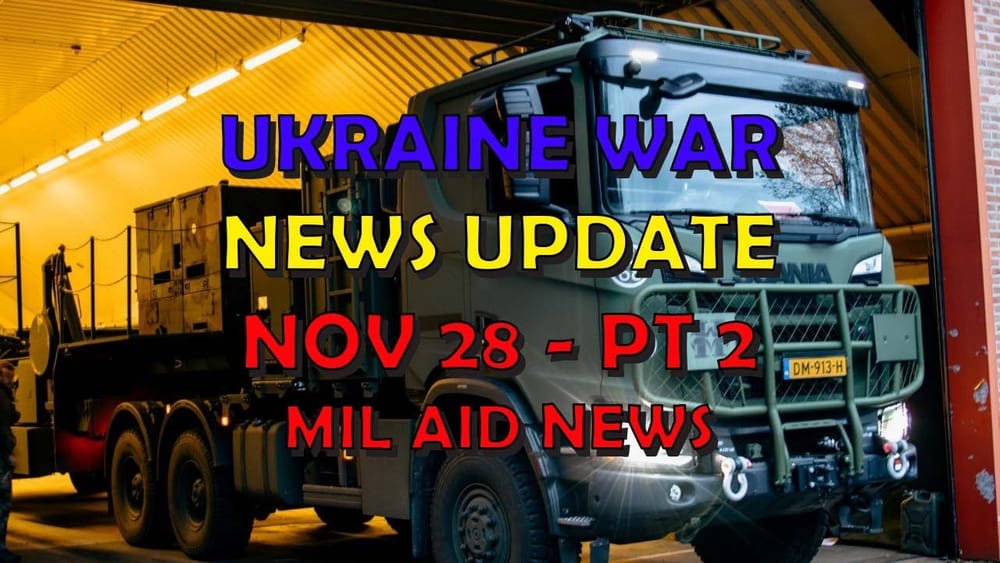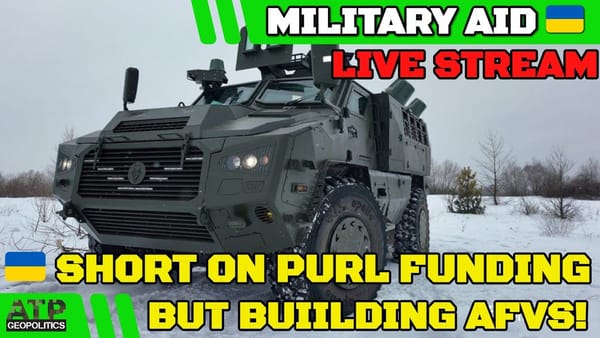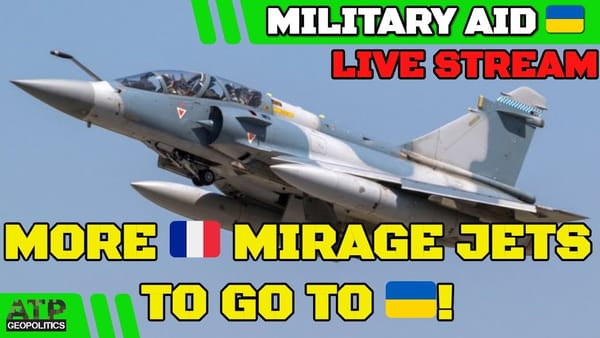Ukraine War Update NEWS: Military Aid News
Table of Contents 📖
Hello Team
🎦 00:00-00:44⏩
Jonathan welcomes viewers to another ATP Geopolitics video: Ukraine War Update News. He notes that it's Thanksgiving for his viewers in the US and jokes that he was going to make a joke about colonists but doesn't elaborate.
Return to top⤴️
US Military Aid for Ukraine
🎦 00:44-06:19⏩
Jonathan begins by discussing a $725 million military aid package for Ukraine from the US. He points out that this is unusually large compared to previous packages, which have typically ranged from $200 to $400 million. He speculates that this could be a strategic move by the Biden administration to ensure Ukraine has a consistent supply of essential equipment, such as ammunition and missiles, for the next six months, given concerns about potential aid reductions under a Trump administration. He highlights concerns about the future of US aid to Ukraine, with the Wall Street Journal reporting that the Biden administration doesn't have enough time left to use the billions of dollars authorized by lawmakers to arm Ukraine. This would leave $6.5 billion in drawdown authority for the incoming Trump administration to decide what to do with. Jonathan notes that while the US has significant military stocks, they may not have the specific types of equipment, such as Bradleys, that Ukraine needs most urgently. He then mentions the US sending emergency aid to Turnip Hill following a Russian attack that critically hit energy infrastructure there two nights ago. The aid includes 400 tons of salt for a local heating company, four heat and power cogeneration units, 2,800 meters of pipes, two repair vehicles, and other supplies to ensure heat and water to households and essential facilities.
Return to top⤴️
US requests for increase in Ukrainian mobilisation
🎦 06:19-08:58⏩
Jonathan shifts focus to the Biden administration's reported push for Ukraine to mobilize more young men, lowering the draft age from 25 to 18, according to the Associated Press. He acknowledges the complex arguments surrounding this issue, highlighting the need for more troops while recognizing the potential long-term consequences for Ukraine's economy, culture, and demographics. He points out the sensitivity of the US making such recommendations, considering it's not their citizens being sent into harm's way, while also acknowledging the significant role the US plays in providing military equipment to Ukraine. Jonathan shares a comment from viewer Ilya Ponomarenko, who argues that lowering the draft age while Western partners remain hesitant to provide certain weapons and equipment doesn't seem like a sustainable long-term strategy. He concludes this section by emphasizing the challenging dilemma faced by Ukraine, acknowledging the valid arguments both for and against increased mobilization.
Return to top⤴️
International Military Aid for Ukraine
🎦 08:58-11:56⏩
Jonathan moves on to discuss international military aid, starting with South Korea's refusal to sell weapons to Ukraine, citing legislation that prohibits arms exports to countries at war. This decision comes despite a recent visit from a Ukrainian delegation led by Ruslan Umarov, who presented a wish list of military equipment, including air defense missiles and artillery systems. Jonathan expresses disappointment, emphasizing South Korea's potential as a significant contributor to Ukraine's defense. He then highlights insights from a German editor, quoting Major General Christian Freuden, head of the planning and command staff in the German MOD. Freuden suggests that the deployment of North Korean soldiers, while concerning, might not significantly impact the battlefield due to potential challenges in equipping, training, and integrating them into Russian units. Jonathan challenges this assessment, arguing that even with integration difficulties, North Korean troops and materiel could still pose a significant challenge, citing reports of North Korea supplying Russia with thousands of artillery shells and missiles. He underscores the critical importance of North Korea as an ally for Russia. Continuing with the German editor's insights, Jonathan notes Freuden's statement that the future of US aid to Ukraine under a Trump administration remains uncertain, but based on conversations with Ukrainian officials, there's hope that aid won't be completely cut off.
Return to top⤴️
Potential impact of US Election on Ukraine
🎦 11:56-14:32⏩
Jonathan expresses concern about the potential impact of the upcoming Trump administration on US support for Ukraine. He acknowledges the presence of both hawkish, anti-Russia Republicans and pro-Russia MAGA supporters within the GOP, creating uncertainty about the administration's overall stance. While he finds some reassurance in Trump's appointment of Mike Waltz as National Security Advisor and Keith Kellogg as an envoy, he remains cautious, particularly regarding Kellogg's proposed peace plan, which involves forcing Ukraine and Russia into negotiations. He fears this could be detrimental to Ukraine's position. Despite his concerns, Jonathan hopes that the Trump administration will remain open to intelligence briefings and adjust its stance on Ukraine accordingly. He stresses the importance of understanding the complexities of the situation and avoiding preconceived notions. He expresses hope that access to intelligence will sway key figures within the administration towards a more supportive position on Ukraine.
Return to top⤴️
European Nations pledge to increase support for Ukraine
🎦 14:32-18:43⏩
Jonathan discusses the commitment from Baltic and Nordic countries, along with Poland, to increase their support for Ukraine. He cites reports from the Kyiv Independent that the heads of government from these nations have agreed to strengthen their backing in the coming months, countering Russia's full-scale war. This support extends beyond military aid, encompassing sanctions against Russia and entities enabling its aggression. He highlights a quote from TVP World, a Polish source, emphasizing their joint commitment to deterring and defending against Russian aggression, both conventional and hybrid, and expanding sanctions. Jonathan emphasizes the significance of these nations' pledge to sanction those aiding Russia, demonstrating a broader approach to countering Russian aggression. Jonathan acknowledges the significant contributions these nations already make to Ukraine's defense, emphasizing that they are the largest per capita contributors of military assistance. While the US remains the largest overall donor due to its size and GDP, Jonathan commends these countries for their commitment, exceeding many larger nations in their support for Ukraine. He reads excerpts from a joint statement released by the Nordic-Baltic summit, further underlining their unwavering support for Ukraine's victory and its integration into European and Euro-Atlantic institutions. The statement strongly condemns Russia's actions, labeling it as the most significant direct threat to their security and highlighting the devastating impact of Russia's aggression on global stability. Jonathan praises the strength and clarity of this joint statement, emphasizing its significance in reassuring Ukraine of their unwavering commitment. He expresses hope that these nations' commitment will help Ukraine achieve a favorable outcome in the war, particularly in light of potential uncertainties surrounding US aid under a Trump administration.
Return to top⤴️
Netherlands send Patriot Launchers and Mine Hunter
🎦 18:43-20:28⏩
Jonathan shifts focus to the Netherlands' contribution to Ukraine's defense, reporting that the Royal Netherlands Navy has donated a mine hunter, the MACOM, to Ukraine. This follows a similar move by the UK, bolstering Ukraine's mine-hunting capabilities in anticipation of post-war efforts to secure the Black Sea. He also highlights the Netherlands' provision of three Patriot launchers to Ukraine, confirmed by the Ukrainian MOD. Jonathan expresses uncertainty about the specific type of launchers provided, speculating whether they are the truck-mounted variant used by Germany, known for their mobility and ability to be deployed closer to the front lines.
Return to top⤴️
Italian Region of Lombardy and Lithuanian support
🎦 20:28-21:02⏩, 21:30-21:56⏩
Jonathan shares news of the Lombardy region in Italy signing a memorandum of cooperation with Zaporizhzhia, Ukraine, focusing on reconstruction efforts. The agreement follows discussions between Zaporizhzhia's Ivan Fedorov and Lombardy's President, Atalio Fontana, highlighting regional support for Ukraine's recovery. He briefly mentions Lithuania's support for France's suggestion of potentially deploying Western troops to Ukraine, without elaborating further. Jonathan raises concerns about reported issues with Ukraine's domestic ammunition production, specifically a claim that only one in 17 mortar rounds are functioning properly. While acknowledging the positive development of Ukraine ramping up domestic production, he stresses the urgency of addressing this quality control issue.
Return to top⤴️
North Korea increases military support to Russia
🎦 21:56-22:28⏩
Jonathan reiterates the significant military support North Korea is providing to Russia, reporting that over 18,000 containers of ammunition and over 100 ballistic missiles have been shipped, bolstering Russia's war efforts.
Return to top⤴️
Putin's Nuclear Rhetoric
🎦 22:28-23:58⏩
Jonathan reports on Putin's continued missile and nuclear threats at the CSTO meeting in Astana, Kazakhstan. Putin boasts about Russia's missile production capabilities, claiming they produce ten times more missiles than all NATO countries combined and plan to increase production by a further 25%. He highlights the development of new missile systems, including the Iskander, which he claims surpasses the capabilities of all three Atakan modifications, and boasts about Russia's unmatched hypersonic missile systems like the Kinzhal. Putin also issues threats regarding the Reshnik, a new weapon system he claims is comparable in destructive force to a nuclear weapon, and asserts that Russia is actively selecting targets in Ukraine for its use. Jonathan characterizes these statements as "big rhetoric" and "saber-rattling," suggesting that Putin's claims about Russia's military might may be exaggerated.
Return to top⤴️
Hybrid Warfare and Article 5
🎦 23:58-28:01⏩
Jonathan discusses a report from Euromaidan Press, citing US intelligence assessments that the risk of Russia resorting to nuclear weapons remains low, despite Putin's rhetoric. He suggests that Putin's threats are primarily psychological, aimed at deterring Western support for Ukraine, and emphasizes that hybrid warfare, which is already ongoing, poses a more immediate threat than a nuclear strike. Jonathan expresses frustration with the lack of a decisive response to Russia's hybrid warfare tactics, questioning why cyberattacks on critical infrastructure aren't considered acts of war warranting a NATO Article 5 response. He argues that attacks on infrastructure like hospitals, whether through conventional bombing or cyberattacks, should be treated with equal seriousness, as both can lead to loss of life and disruption of essential services. He criticizes the lack of awareness and understanding among the American public regarding the severity of Russia's actions, particularly its cyber and information warfare campaigns targeting the US. Jonathan points out the irony of some Americans perceiving Ukraine as the aggressor while overlooking Russia's ongoing attacks on US interests. In a more positive light, Jonathan observes that Trump has remained relatively silent on Ukraine since his election victory, refraining from publicly expressing the "ill-informed opinions" he has shared in the past. Jonathan speculates that this silence may be due to requests from the current administration or the Pentagon to avoid inflammatory statements that could undermine US interests. He also notes the relative silence from prominent figures like Donald Trump Jr., David Sachs, and Elon Musk, who have been critical of Ukraine, suggesting that they too may have been advised to tone down their rhetoric. Jonathan concludes this section by expressing hope that Trump's silence, along with the muted response from others, indicates a willingness to engage with intelligence briefings and gain a more informed perspective on the situation. He believes that exposure to classified information could lead to a shift in their understanding of Russia's actions and the importance of supporting Ukraine.
Return to top⤴️
Wrap up
🎦 28:01-28:06⏩
Jonathan concludes the video with well wishes to viewers.
Return to top⤴️
"We say it's war when a tank comes across our border but if a bomb was to drop on a hospital we would say that is war. But if a hospital network is taken out by cyber warfare, we're like, 'oh that's hybrid warfare'. We know Russia's done it, but that's not seen as war. At what point does this trigger Article 5? At what point do you say, 'hang on, that's functionally the same as dropping a bomb on it?'"



